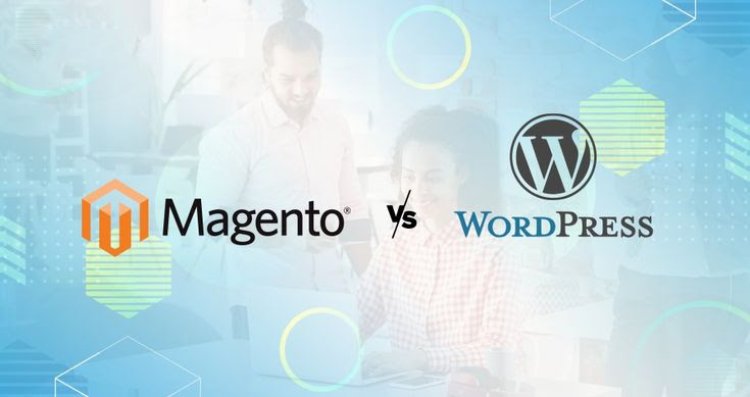Magento vs. WordPress: Which Powers Your 2025 Growth?
Magento vs. WordPress: Magento suits large-scale businesses, while WordPress is ideal for simpler, cost-effective growth. Which is right for you in 2025?
Share this Post to earn Money ( Upto ₹100 per 1000 Views )

When selecting the ideal platform to fuel your business growth in 2025, Magento and WordPress often dominate the conversation. Both platforms offer robust solutions, yet each caters to different business needs. This guide will dive deep into the features, advantages, and challenges of Magento and WordPress to help you make an informed decision.
Understanding Magento and WordPress
Magento: A Leader in E-Commerce Development
Magento is a powerful open-source platform tailored for e-commerce services. Renowned for its flexibility and scalability, it’s ideal for businesses managing extensive product catalogs and delivering a seamless shopping experience.
Key Features of Magento:
Advanced Customization: Magento allows full customization, enabling businesses to create unique, brand-specific e-commerce stores.
Scalability: Magento grows with your business and is suitable for both small and large enterprises.
Robust Security: Magento offers top-tier security features, ensuring safe transactions and protecting sensitive customer data.
Mobile Optimization: Its mobile-responsive designs cater to the rising demand for mobile development in e-commerce.
WordPress: The All-in-One Content Management System
WordPress is the leading content management system (CMS), powering more than 40% of websites worldwide. Known for its user-friendly interface and extensive plugin ecosystem, WordPress is the go-to choice for businesses focusing on blogging, content-driven sites, and lightweight e-commerce setups.
Key Features of WordPress:
Ease of Use: With its intuitive interface, even beginners can create professional websites.
Plugins for Every Need: From SEO tools to social media marketing integrations, WordPress has plugins to enhance functionality.
Flexible E-Commerce Options: Through plugins like WooCommerce, WordPress offers a simplified yet powerful way to manage online stores.
Cost-Effectiveness: WordPress is budget-friendly, making it ideal for startups and small businesses.
Head-to-Head Comparison: Magento vs. WordPress
E-Commerce Capabilities
Magento: Built for large-scale e-commerce businesses, Magento excels in managing high-volume sales, complex product variations, and advanced analytics.
WordPress: With WooCommerce, WordPress is perfect for small to medium-sized e-commerce setups but may struggle with high-scale operations.
Customization and Flexibility
Magento: Offers unparalleled customization, allowing developers to tweak every aspect of the website. However, it requires technical expertise.
WordPress: While customizable, it’s more limited than Magento in terms of large-scale e-commerce modifications.
SEO and Digital Marketing
Magento: Comes with built-in SEO features but may require additional extensions for digital marketing offers and campaigns.
WordPress: SEO-friendly out of the box, with plugins like Yoast SEO making optimization accessible for all users.
Performance and Scalability
Magento: Designed for scalability, Magento can handle high traffic and complex operations seamlessly.
WordPress: Performance may degrade with heavy plugins or excessive customization, particularly on shared hosting plans.
Cost Considerations
Magento: The initial cost and ongoing maintenance can be high, particularly for Magento Commerce (enterprise version).
WordPress: Offers a cost-effective solution with minimal upfront investment, though premium plugins can add to the cost.
Choosing the Right Platform for Your Business
When to Choose Magento
If your business involves high transaction volumes, complex product catalogs, and a global reach, Magento is your best bet. It’s particularly suited for industries like electronics, fashion, and large-scale retail.
When to Choose WordPress
For businesses that prioritize content marketing, lightweight e-commerce, and a quick setup, WordPress is ideal. Bloggers, small business owners, and startups can leverage WordPress’s versatility to establish a strong online presence.
Integrating Marketing Services with Your Chosen Platform
In 2025, integrating marketing services like SEO, social media strategies, and digital marketing offers will be crucial for business growth. Here’s how Magento and WordPress stack up in supporting marketing efforts:
Magento: Advanced extensions for personalized marketing campaigns, email automation, and customer segmentation make it a strong contender for large-scale businesses.
WordPress: Seamless integration with marketing plugins ensures effective social media marketing and lead generation, particularly for small to medium businesses.
How Mobile App Development Contributes to Business Expansion and Success
With the increasing reliance on smartphones, businesses must consider mobile app development alongside their web platforms. Both Magento and WordPress can support mobile-friendly solutions:
Magento: Offers dedicated extensions for mobile optimization, including PWA (Progressive Web Apps) integration.
WordPress: Responsive themes and plugins like AppPresser make it easy to create mobile-friendly websites.
Conclusion: Magento or WordPress?
The choice between Magento and WordPress ultimately depends on your specific business goals, budget, and level of technical expertise. Magento is designed for large-scale e-commerce businesses that require scalability, advanced customization, and the ability to handle high transaction volumes. It is particularly well-suited for enterprises with extensive product catalogs and a global customer base, offering robust features that cater to complex e-commerce operations. However, Magento’s powerful capabilities often come with higher costs and a steeper learning curve, making it better suited for businesses with dedicated development teams and larger budgets.
On the other hand, WordPress excels in its flexibility, user-friendliness, and cost-effectiveness, making it an excellent choice for small business owners, startups, bloggers, and those who prioritize content-driven websites. With plugins like WooCommerce, WordPress allows businesses to set up lightweight e-commerce stores quickly while still providing ample opportunities for growth. Its vast ecosystem of themes and plugins also supports seamless integration with marketing tools, enabling businesses to implement effective strategies for e-commerce services, digital marketing offers, and social media marketing.
By leveraging the strengths of either platform and pairing them with the right tools and strategies, businesses of all sizes can achieve significant growth and establish a competitive edge in 2025. Both Magento and WordPress, when optimized effectively, can serve as powerful engines driving your business success in the rapidly evolving digital landscape.














